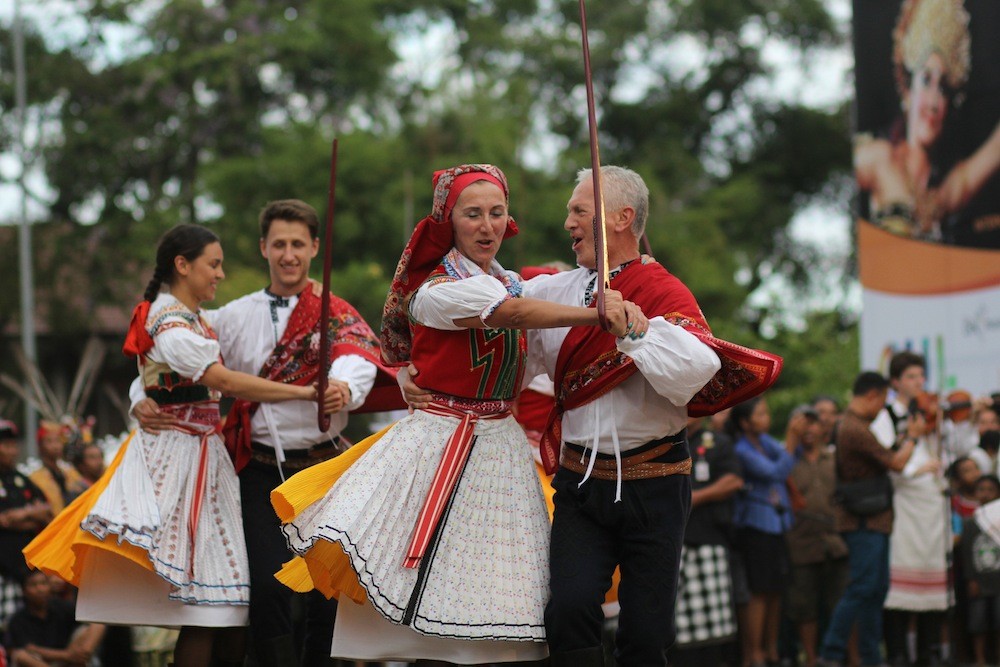Popular Reads
Top Results
Can't find what you're looking for?
View all search resultsPopular Reads
Top Results
Can't find what you're looking for?
View all search resultsWorld Culture Forum: Local knowledge bridges development gap
Change text size
Gift Premium Articles
to Anyone
 Dancers from Czech Republic perform a traditional dance during the cultural carnival at the World Culture Forum in Denpasar, Bali, on Tuesday. Fourteen countries took part in the carnival by performing their folk dances. Local culture should be the backbone of sustainable development programs that overcome infrastructure and human resources limits that have caged progress in developing economies, according to speakers at a forum in Bali. (JP/Zul Trio Anggono)
Dancers from Czech Republic perform a traditional dance during the cultural carnival at the World Culture Forum in Denpasar, Bali, on Tuesday. Fourteen countries took part in the carnival by performing their folk dances. Local culture should be the backbone of sustainable development programs that overcome infrastructure and human resources limits that have caged progress in developing economies, according to speakers at a forum in Bali. (JP/Zul Trio Anggono)
S
cholars and activists participating in the World Culture Forum 2016 (WCF) in Bali said they were committed to formulating a work plan to advance local culture as an integral part of sustainable development.
“This second WCF will push the Bali Promise further toward a more detail and comprehensive insight into the cultural paradigms embedded in sustainable development projects,” Hilmar Farid, director general of culture at the Culture and Education Ministry, said Tuesday.
As an initiative of the Indonesian government that has been supported by UNESCO, the forum has gathered experts and scholars to collect best practices that have been used to support sustainable development around the world. In its first event in 2013, the forum produced the Bali Promise, which was later welcomed by the UN General Assembly.
This year’s meeting consists of a series of symposiums that discuss various local initiatives in Indonesia and other countries.
The first symposium used “Reviving Culture for Rural Sustainability” as its theme. The participants, Aleta Baun, head of Molo village in East Nusa Tenggara, Lee Yeon-tak from South Korea’s Yeongnam University and Lanying Zhang, director of the Liang Shuming Rural Reconstruction Center in China, discussed the plurality of practices and experiments on sustainable development at the village level.
The local experiences shared by the speakers shed new light on developmental issues, including on the role of women in village governance and the paradigm that development should proceed from the periphery in order to secure welfare equality nationwide.
The second symposium, that had the theme “Water for Life, Reconciling Socio-Economic Growth and Environmental Ethics”, discussed the role of water to tie together the social structure of everyday life and as a fundamental element of economic growth.
Wayan Windia from Udayana University, presented Bali’s traditional irrigation system called subak as a good example of how to preserve water and culture and he spoke about the challenges faced by farmers to protect the tradition amid modern development on the resort island. Subak has been recognized by UNESCO as a part of world heritage.
The session also featured Indonesian environmentalist Hendro Sangkoyo and Satoko Kishimoto from the Water Justice Project of the Transnational Institute.
Kishimoto made a presentation about reclaiming public water networks, including the contribution of her organization to the success of several places worldwide in reversing water privatization. “In the last 15 years, 235 cities in 37 countries have brought water services back under public control, benefitting more than 100 million people.
“Everybody needs water. Water should not become a commodity to earn profits, or it causes problems. Water services should be managed under public control,” she said.









